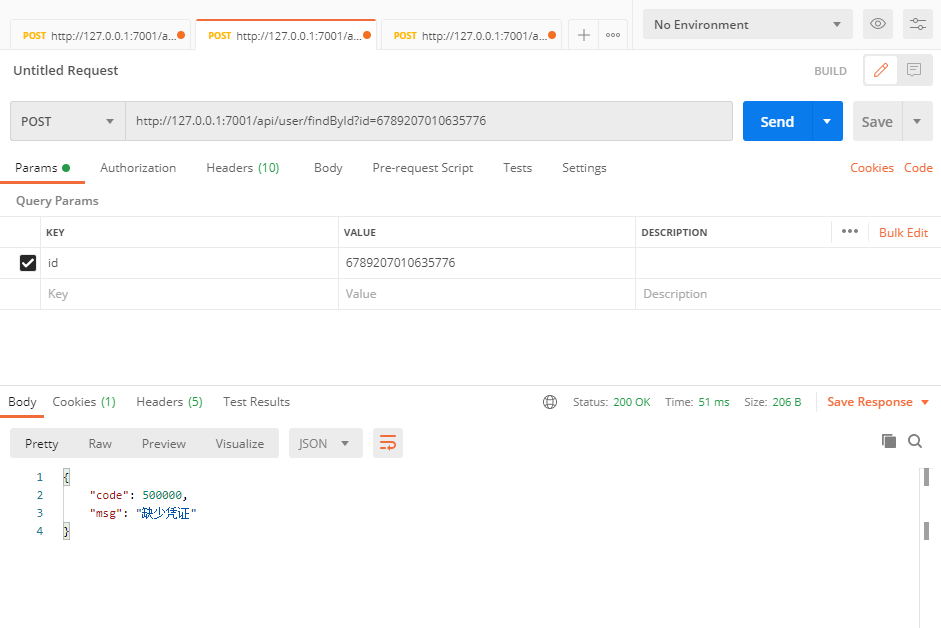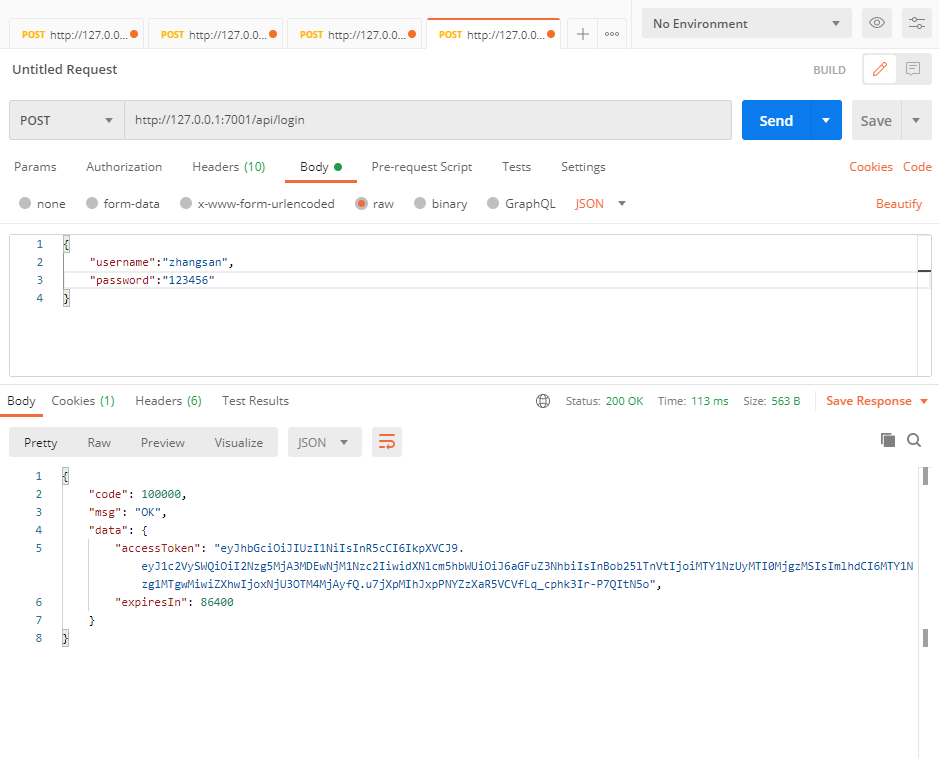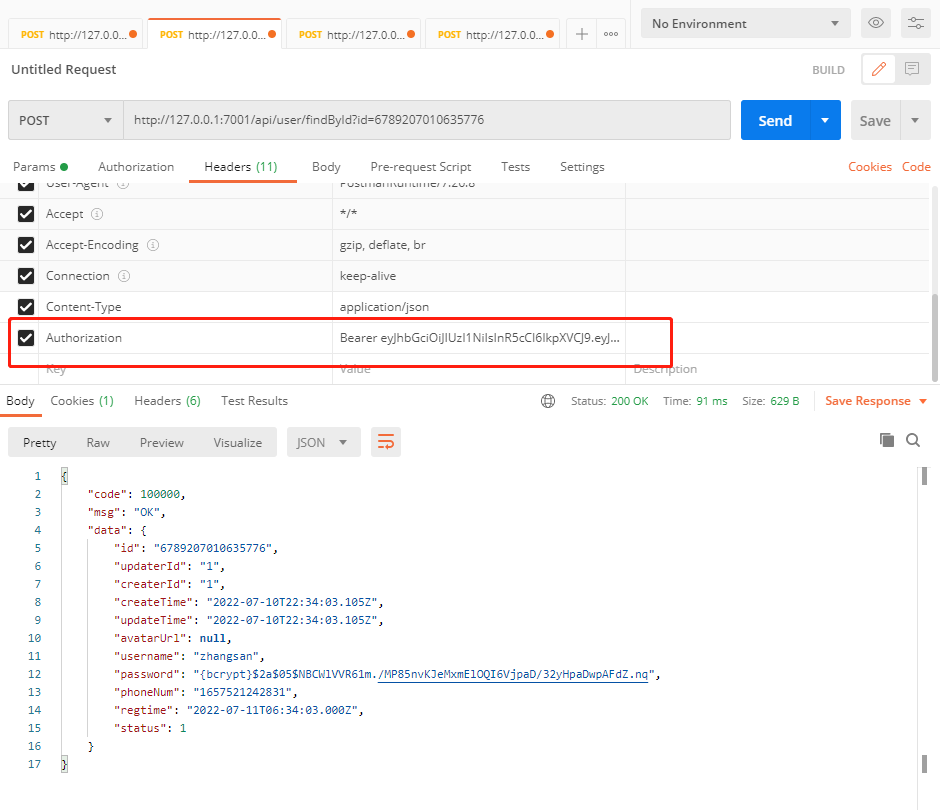阅读本文前,需要提前阅读前置内容:
一、Midway 增删改查
二、Midway 增删改查的封装及工具类
三、Midway 接口安全认证
四、Midway 集成 Swagger 以及支持JWT bearer
五、Midway 中环境变量的使用
样例源码
DEMO LIVE
很多时候,后端接口需要登录后才能进行访问,甚至有的接口需要拥有相应的权限才能访问。
这里实现bearer验证方式(bearerFormat 为 JWT)。
安装JWT组件
>npm i @midwayjs/jwt@3 --save
>npm i @types/jsonwebtoken --save-dev
安装完后package.json文件中会多出如下配置
{
"dependencies": {
"@midwayjs/jwt": "^3.3.11"
},
"devDependencies": {
"@types/jsonwebtoken": "^8.5.8"
}
}
添加JWT配置
- 修改
src/config/config.default.ts,添加如下内容;
// src/config/config.default.ts
jwt: {
secret: 'setscrew',
expiresIn: 60 * 60 * 24,
}
- 注册
JWT组件;
// src/configuration.ts
import * as jwt from '@midwayjs/jwt';
@Configuration({
imports: [
jwt,
//...
],
})
export class ContainerLifeCycle {
//...
}
关于JWT的详细使用文档,见:http://www.midwayjs.org/docs/extensions/jwt
安装Redis组件
>npm i @midwayjs/redis@3 --save
>npm i @types/ioredis --save-dev
安装完后package.json文件中会多出如下配置
{
"dependencies": {
"@midwayjs/redis": "^3.0.0"
},
"devDependencies": {
"@types/ioredis": "^4.28.7"
}
}
注册Redis组件
// src/configuration.ts
import * as redis from '@midwayjs/redis';
@Configuration({
imports: [
redis,
// ...
],
})
export class ContainerLifeCycle {
// ...
}
添加配置
修改src/config/config.default.ts,添加如下内容:
添加Redis配置
// src/config/config.default.ts
redis: {
client: {
host: 127.0.0.1,
port: 6379,
db: 0,
},
}
关于Redis的详细使用文档,见:http://www.midwayjs.org/docs/extensions/redis
添加安全拦截配置
// src/config/config.default.ts
app: {
security: {
prefix: '/api', # 指定已/api开头的接口地址需要拦截
ignore: ['/api/login'], # 指定该接口地址,不需要拦截
},
}
添加接口安全拦截中间件
添加常量定义
// src/common/Constant.ts
export class Constant {
// 登陆验证时,缓存用户登陆状态KEY的前缀
static TOKEM = 'TOKEN';
}
添加用户访问上下文类
// src/common/UserContext.ts
/**
* 登陆后存储访问上下文的状态数据,同时也会存在redis缓存中
*/
export class UserContext {
userId: number;
username: string;
phoneNum: string;
constructor(userId: number, username: string, phoneNum: string) {
this.userId = userId;
this.username = username;
this.phoneNum = phoneNum;
}
}
新增或者编辑src/interface.ts,将UserContext注册到ApplecationContext中
// src/interface.ts
import '@midwayjs/core';
import { UserContext } from './common/UserContext';
declare module '@midwayjs/core' {
interface Context {
userContext: UserContext;
}
}
新增中间件src/middleware/security.middleware.ts
// src/middleware/security.middleware.ts
import { Config, Inject, Middleware } from '@midwayjs/decorator';
import { Context, NextFunction } from '@midwayjs/koa';
import { httpError } from '@midwayjs/core';
import { JwtService } from '@midwayjs/jwt';
import { UserContext } from '../common/UserContext';
import { RedisService } from '@midwayjs/redis';
import { Constant } from '../common/Constant';
/**
* 安全验证
*/
@Middleware()
export class SecurityMiddleware {
@Inject()
jwtUtil: JwtService;
@Inject()
cacheUtil: RedisService;
@Config('app.security')
securityConfig;
resolve() {
return async (ctx: Context, next: NextFunction) => {
if (!ctx.headers['authorization']) {
throw new httpError.UnauthorizedError('缺少凭证');
}
const parts = ctx.get('authorization').trim().split(' ');
if (parts.length !== 2) {
throw new httpError.UnauthorizedError('无效的凭证');
}
const [scheme, token] = parts;
if (!/^Bearer$/i.test(scheme)) {
throw new httpError.UnauthorizedError('缺少Bearer');
}
// 验证token,过期会抛出异常
const jwt = await this.jwtUtil.verify(token, { complete: true });
// jwt中存储的user信息
const payload = jwt['payload'];
const key = Constant.TOKEM + ':' + payload.userId + ':' + token;
const ucStr = await this.cacheUtil.get(key);
// 服务器端缓存中存储的user信息
const uc: UserContext = JSON.parse(ucStr);
if (payload.username !== uc.username) {
throw new httpError.UnauthorizedError('无效的凭证');
}
// 存储到访问上下文中
ctx.userContext = uc;
return next();
};
}
public match(ctx: Context): boolean {
const { path } = ctx;
const { prefix, ignore } = this.securityConfig;
const exist = ignore.find((item) => {
return item.match(path);
});
return path.indexOf(prefix) === 0 && !exist;
}
public static getName(): string {
return 'SECURITY';
}
}
@Config('app.security')装饰类,指定加载配置文件src/config/config.**.ts中对应的配置信息;- 使用
JwtService进行JWT编码校验;
jwt token将用户信息编码在token中,解码后可以获取对应用户数据,通常情况下,不需要存储到redis中;
但是有个缺点就是,不能人为控制分发出去的token失效。所以,有时人们会使用缓存中的用户信息;
这里使用了JWT+Redis的方式,是为了演示两种做法;
注册中间件
// src/configuration.ts
this.app.useMiddleware([SecurityMiddleware, FormatMiddleware, ReportMiddleware]);
添加登陆接口
- 添加DTO;
// src/api/dto/CommonDTO.ts
export class LoginDTO {
username: string;
password: string;
}
- 添加VO;
// src/api/vo/CommonVO.ts
export class LoginVO {
accessToken: string;
expiresIn: number;
}
- 修改
src/service/user.service.ts,添加通过用户名查找用户接口;
import { Provide } from '@midwayjs/decorator';
import { User } from '../eneity/user';
import { InjectEntityModel } from '@midwayjs/orm';
import { Repository } from 'typeorm';
import { BaseService } from '../common/BaseService';
@Provide()
export class UserService extends BaseService<User> {
@InjectEntityModel(User)
model: Repository<User>;
getModel(): Repository<User> {
return this.model;
}
async findByUsername(username: string): Promise<User> {
return this.model.findOne({ where: { username } });
}
}
- 添加Controller
src/controller/common.controller.ts;
// src/controller/common.controller.ts
import { Body, Config, Controller, Inject, Post } from '@midwayjs/decorator';
import { Context } from '@midwayjs/koa';
import { UserService } from '../service/user.service';
import { RedisService } from '@midwayjs/redis';
import { LoginDTO } from '../api/dto/CommonDTO';
import { LoginVO } from '../api/vo/CommonVO';
import { SnowflakeIdGenerate } from '../utils/Snowflake';
import { JwtService } from '@midwayjs/jwt';
import { Assert } from '../common/Assert';
import { ErrorCode } from '../common/ErrorCode';
import { UserContext } from '../common/UserContext';
import { Constant } from '../common/Constant';
import { ILogger } from '@midwayjs/core';
import { decrypt } from '../utils/PasswordEncoder';
import { Validate } from '@midwayjs/validate';
import { ApiResponse, ApiTags } from '@midwayjs/swagger';
@ApiTags(['common'])
@Controller('/api')
export class CommonController {
@Inject()
logger: ILogger;
@Inject()
ctx: Context;
@Inject()
userService: UserService;
@Inject()
cacheUtil: RedisService;
@Inject()
jwtUtil: JwtService;
@Inject()
idGenerate: SnowflakeIdGenerate;
@Config('jwt')
jwtConfig;
@ApiResponse({ type: LoginVO })
@Validate()
@Post('/login', { description: '登陆' })
async login(@Body() body: LoginDTO): Promise<LoginVO> {
const user = await this.userService.findByUsername(body.username);
Assert.notNull(user, ErrorCode.UN_ERROR, '用户名或者密码错误');
const flag = decrypt(body.password, user.password);
Assert.isTrue(flag, ErrorCode.UN_ERROR, '用户名或者密码错误');
const uc: UserContext = new UserContext(user.id, user.username, user.phoneNum);
const at = await this.jwtUtil.sign({ ...uc });
const key = Constant.TOKEM + ':' + user.id + ':' + at;
const expiresIn = this.jwtConfig.expiresIn;
this.cacheUtil.set(key, JSON.stringify(uc), 'EX', expiresIn);
const vo = new LoginVO();
vo.accessToken = at;
vo.expiresIn = expiresIn;
return vo;
}
}
使用Postman验证
- 调用接口(未设置凭证);

- 使用登陆接口获取token;

- 调用接口(使用凭证);

版权所有,转载请注明出处 [码道功成]
最后
以上就是无聊小蝴蝶最近收集整理的关于三、Midway 接口安全认证的全部内容,更多相关三、Midway内容请搜索靠谱客的其他文章。
本图文内容来源于网友提供,作为学习参考使用,或来自网络收集整理,版权属于原作者所有。








发表评论 取消回复